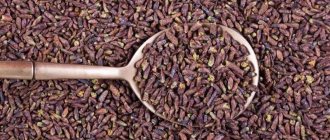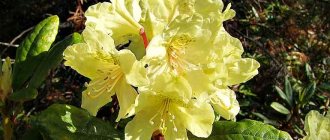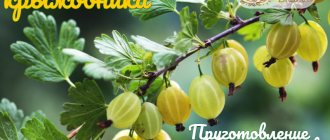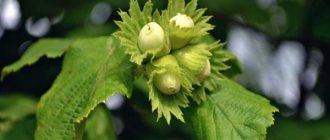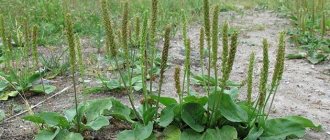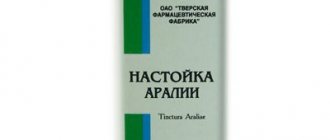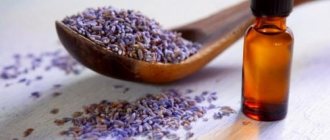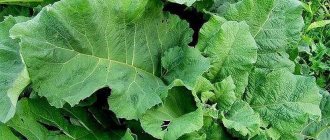Review of types of kidney tea. Composition of the drug
True tea is a product based on orthosiphon stamen (cat's whisker). This is a plant of the Lamiaceae family that grows in Asia and Australia. The composition of the drug, which is sold in pharmacies, includes crushed, dry orthosiphon leaves.
Orthosiphon stamen is a powerful antibacterial and diuretic
The components are:
- Orthosiphon. It has an antimicrobial effect, inhibiting the growth and reproduction of pathogenic bacteria. An important property of orthosiphon is increased diuresis. The plant helps remove microbes, cleanse the body of toxic compounds, remove urea, uric acid and chlorides.
- Organic acids (citric, rosemary).
- Saponins.
- Flavonoids.
- Tanning compounds.
- Microelements and macroelements.
- Fatty acid.
- Essential oils.
The following infusions are widely used for kidney diseases:
- With lingonberries. The main component is lingonberry leaves. They are rich in vitamin C, minerals (potassium, manganese, calcium). To prepare this diuretic you need to take 1 tbsp. l. plants and 200 g of boiling water.
- Herbal tea (kidney collection) Nephrophyte. It contains only plant components. The ingredients of this product are burdock roots, bearberry leaves, knotweed, string, dandelion, chamomile, corn silk, mint and shepherd's purse herb.
- Urophyton. It is used as a diuretic, antispasmodic, disinfectant and antimicrobial agent. Auxiliary components are horsetail, licorice, birch leaves and plantain.
- Evalar Bio for kidneys. Available in powder form. This is a urological collection containing bearberry leaves, birch leaves, knotweed grass and cherry stalks. The biologically active components are flavonoids and arbutin.
- Phytonephrol. Kidney tea contains bearberry, peppermint, dill, calendula flowers and eleutherococcus root. Suitable for children and adults.
- Tea with bearberry leaves. This is a herbal medicine that has antimicrobial, anti-inflammatory and diuretic effects. Available in powder form. Contraindicated in acute renal failure and acute form of glomerulonephritis, pregnant women and children under 12 years of age. To prepare the infusion, you need to fill 2 filter bags with a glass of boiling water and let it brew for 15 minutes.
- Lingonberry leaves. Tea is prepared from them in the form of an infusion or decoction.
- Birch leaves. A herbal medicine with a diuretic effect. Prescribed to patients with renal edema.
phytonephrol included medicinal herbs with diuretic and anti-inflammatory effects
Purpose of tea
Tea is prescribed by the attending physician (urologist, nephrologist or therapist). When choosing a product, the following are taken into account:
- physiological state (pregnancy, lactation period);
- patient's age;
- allergy history;
- tolerability of drug components;
- presence of concomitant pathology;
- degree of renal dysfunction.
medicinal herbs with diuretic properties have antiseptic, anti-inflammatory and diuretic effects
Useful properties of components
The components of tea have the following effects on the human body:
- Antiseptic (kill pathogenic microorganisms).
- Anti-inflammatory.
- Diuretic (improves the filtration function of the liver and promotes the removal of excess fluid).
- Astringent.
- Antispasmodic (eliminates spasms of smooth muscles of internal organs).
- Prevents the formation of urolithiasis (calculi).
- Choleretic (favorably affects the digestive organs and bile production).
How tea works. pharmachologic effect
Tea in bags and dried leaf form is effective when consumed orally. First, biologically active substances (glycosides, oils, acids, saponins) enter the gastrointestinal tract and are absorbed into the blood. Through it, the active substances are distributed to all organs, including the kidneys and bladder.
Tea ingredients suppress inflammatory reactions, reduce tissue swelling, improve the functioning of the glomeruli and renal tubules, and help cleanse tissues of bacteria. The filtration function of the kidneys increases and reabsorption (reabsorption of fluid) slows down, which leads to an increase in daily diuresis and an increase in the frequency of voiding. With urine, the body removes toxic metabolic products and microbes.
kidney tea has a wide range of therapeutic effects and a wide range of applications
Beneficial properties of kidney tea
Herbal kidney tea has been helping people deal with kidney problems for centuries, so it has gained a good reputation and is still in demand today. This drink has numerous positive effects:
- Relieves foci of inflammation.
- Destroys various types of infections and reduces the growth of pathogenic microorganisms.
- Increases the speed of reabsorption and filtration processes in the kidneys, restores urine output.
- Relieves spasms in renal colic and reduces pain.
- Fights swelling due to urinary problems, and also initiates the removal of excess fluid from the body of a pregnant woman.
- Breaks down small stones and flushes sand out of the kidneys, alkalizing the urine.
- It affects the gastric mucosa, increasing the secretion of hydrochloric acid, and thereby promotes better digestion of food during the period of herbal treatment.
See also: Tea with Reishi mushroom - a unique healing drink
Medicinal properties of tea. Indications for use of the drug
You can drink tea based on medicinal herbs not only for kidney pathology. Indications for the use of kidney tea are:
- Acute pyelonephritis. A nonspecific, inflammatory disease that affects the renal pelvis and parenchyma. More often it is of a bacterial nature (caused by cocci, Escherichia coli and Pseudomonas aeruginosa). Often occurs against the background of narrowing of the urethra, cystitis, urethritis, prostatitis and hypothermia. Symptoms include fever, abdominal or lower back pain, nausea, headache, tachycardia, sweating, bowel movements and bloating.
- Chronic pyelonephritis. Develops against the background of acute inflammation with improper treatment. Urinary syndrome is most often absent. Characteristic changes in urine parameters (admixture of protein, decreased density, presence of bacteria and leukocytes). Possible polyuria.
- Cystitis (acute and chronic). Inflammation of the bladder, manifested by pain in the pubic area, frequent voiding, pain during urination. The general condition most often does not suffer.
- Acute glomerulonephritis. An immunoinflammatory kidney disease that affects the glomeruli. Symptoms include swelling, increased blood pressure, headache, vomiting, nausea, blood and protein in the urine, and lower back pain.
- Chronic glomerulonephritis.
- Renal edema. Occurs as a result of fluid retention. Swelling is localized on the face, descending from top to bottom, soft, large, prone to movement, warm to the touch.
- Urethritis. Inflammation of the mucous membrane of the urethra.
- Urolithiasis disease.
Along with these diseases, kidney tea helps cure gout, cholecystitis (inflammation of the gallbladder), benign prostatic hyperplasia and prostatitis.
The most valuable and beneficial properties of tea are the ability to enhance diuresis and remove pathogens from the body along with urine.
kidney tea will have a positive effect on women's health, subject to contraindications and dosages
Features for women
Swelling often occurs during pregnancy. In this case, you should consult your doctor before using kidney tea. The following medications can be prescribed to pregnant women:
- crushed leaves of Orthosiphon staminate;
- tea based on lingonberry leaves (effective for nephropathy in pregnant women);
- Phytonephrol.
It is possible to drink tea based on birch leaves, but only if the desired benefit outweighs the potential harm. During pregnancy, products such as bearberry leaves and Evalar Bio are contraindicated. When breastfeeding a child, it is not a renal supplement that is prescribed, but drugs that improve milk production (Lactomama, etc.).
Features for men
For men, taking kidney tea is useful not only for renal pathology, but also for prostate diseases (adenoma, acute and chronic prostatitis), inflammation of the urethra, cystitis, cholecystitis, urolithiasis, gonorrhea (lingonberry leaves), edema syndrome, inflammation of the joints, inflammatory diseases of the oral cavity , gastritis with low acidity, hepatitis, pneumonia and bronchiectasis.
Is it possible for children
These drugs are prescribed to children only from 12 years of age. This is due to the fact that herbs for the kidneys contain substances that have a stimulating effect and enhance the production of hormones and enzymes, which is undesirable at this age.
Contraindications for use
The most common contraindications are:
- pregnancy;
- lactation period;
- children under 12 years of age;
- individual intolerance to components;
- chronic form of renal failure (for tea based on birch leaves);
- acute glomerulonephritis (for tea based on birch leaves);
- acute renal failure (for bearberry).
Side effects and overdose
When using herbal infusions, the following side effects are possible:
- allergic reactions (runny nose, urticaria, exanthema-type rash, redness of the skin, itching);
- dyspepsia in the form of nausea, vomiting, stool disorders (diarrhea or constipation);
- change in the color of urine (when drinking bearberry-based tea, it becomes dark green).
To obtain the greatest therapeutic effect, you must strictly follow the instructions for use and observe contraindications
Instructions for use
When purchasing raw materials at a pharmacy, you should read the instructions for use of this product. Pay attention to special instructions, indications, contraindications and method of use. Orthosiphon leaves exhibit their healing properties only with long-term use (at least 4 months).
How to drink tea correctly on different occasions
It is necessary to use herbal preparations strictly according to the instructions. An infusion is prepared from the orthosiphon stamen. To do this, take from 3 to 10 g of crushed raw materials (kidney tea leaves) and 200 ml of hot water. Infuse for half an hour and take 100 ml 2-3 times a day after meals. Duration of treatment is 4-6 months.
To prepare an infusion based on lingonberry leaves, take raw materials and water in a ratio of 1:10 (10 g and 100 ml, 20 g and 200 ml). Drink 15-30 ml after each meal (3-4 times a day). When using the urological collection Fitonefrol, tea is taken three times a day for 2-4 weeks.
Ready-made products in the form of tea bags are brewed in a glass of water. 3 g of bearberry (2 bags) are placed in a container, poured with 1 glass of boiling water, covered with a lid and allowed to brew for 10-15 minutes. Remove the lid, squeeze out the bags and add boiling water to 200 ml. You need to drink tea warm, 1 tbsp. l. 3-5 times a day 30-40 minutes after meals. Duration of treatment: 20-25 days. Several courses are possible at intervals.
Interaction with other drugs and alcohol
Tea for kidney stones can be prescribed simultaneously with medications (antibiotics, uroantiseptics, antispasmodics, diuretics). Taking alcoholic beverages in the treatment of urological pathology with herbal infusions is contraindicated, despite the pronounced diuretic effect of beer and other drinks. Alcohol breakdown products are partially excreted through the kidneys and can impair their function and reduce the effectiveness of renal decoctions and infusions.
the pharmaceutical industry produces a varied range of kidney teas
Kidney tea during pregnancy
Kidney tea is especially interesting for pregnant women: although it is an undesirable component of therapy, it is often prescribed for edema. Sometimes doctors prescribe diuretic decoctions to expectant mothers to improve kidney function. An infusion of natural ingredients has a gentler effect on the body than chemicals. Herbal tea for the kidneys does not pose a threat to a woman’s health during pregnancy, therefore it is considered relatively harmless.
- Non-surgical treatment of inguinal hernia in men
- How to glue vinyl wallpaper on paper
- Treatment of bronchitis in adults
In order for the course of treatment to bring only benefit, it is important to follow the dosage written in the instructions. While carrying a child, the patient is prescribed a month of therapy, during which she takes the drug in small portions 3-4 times a day. Decoction:
- provides prevention of nephropathy;
- reduces general swelling;
- promotes rapid removal of excess uric acid from the body.

